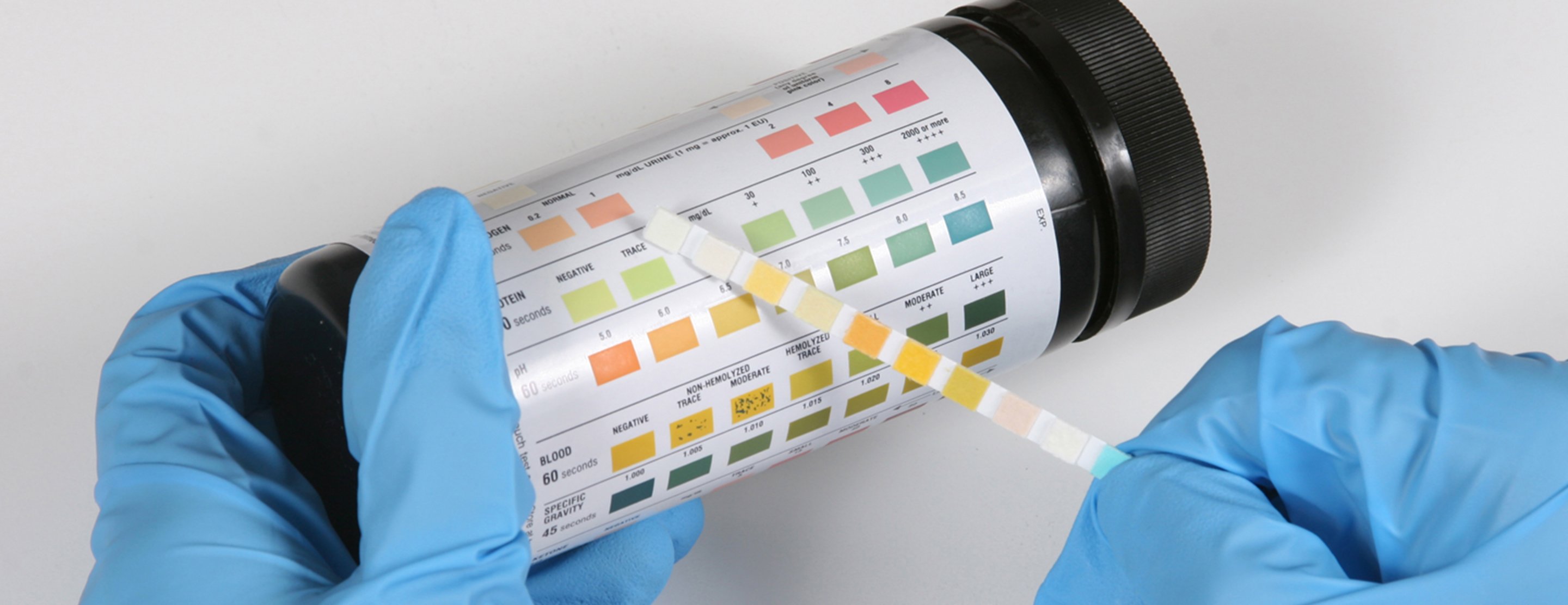
Glucose urine test
Definition
The glucose urine test measures the amount of sugar (glucose) in a urine sample. The presence of glucose in the urine is called glycosuria or glucosuria.
The glucose level can also be measured in other bodily fluids using a
Alternative Names
Urine sugar test; Urine glucose test; Glucosuria test; Glycosuria test
How the Test is Performed
After you provide a urine sample, it is tested right away. The health care provider uses a dipstick made with a color-sensitive pad. The color of the dipstick changes to tells the provider the level of glucose in your urine.
If needed, your provider may ask you to
How to Prepare for the Test
Certain medicines can change the result of this test. Before the test, tell your provider which medicines you are taking. DO NOT stop taking any medicine before talking to your provider.
How the Test will Feel
The test involves only normal urination. There is no discomfort.
Why the Test is Performed
This test was commonly used to test for and monitor diabetes in the past. Now, blood tests to measure glucose level in the blood are easy to do and are usually used instead of the glucose urine test.
The glucose urine test may be ordered when your provider suspects renal glycosuria. This is a rare condition in which glucose is released from the kidneys into the urine, even when the blood glucose level is normal.
Normal Results
Glucose is not usually found in urine. If it is, further testing is needed.
Normal glucose range in urine: 0 to 0.8 mmol/l (0 to 15 mg/dL)
The examples above are common measurements for results of these tests. Normal value ranges may vary slightly among different laboratories. Some labs use different measurements or test different samples. Talk to your provider about the meaning of your specific test results.
What Abnormal Results Mean
Higher than normal levels of glucose may occur with:
Diabetes : Small increases in urine glucose levels after a large meal are not always a cause for concern.- Pregnancy: Up to half of women have glucose in their urine at some time during pregnancy. Glucose in the urine may mean that a woman has
gestational diabetes . - Renal glycosuria: A rare condition in which glucose is released from the kidneys into the urine, even when blood glucose levels are normal.
Risks
There are no risks with this test.
References
American Diabetes Association Professional Practice Committee. 6. Glycemic Goals and Hypoglycemia: Standards of Care in Diabetes-2024. Diabetes Care. 2024;47(Suppl 1):S111-S125. PMID: 38078586
Riley RS, McPherson RA. Basic examination of urine. In: McPherson RA, Pincus MR, eds. Henry's Clinical Diagnosis and Management by Laboratory Methods. 24th ed. Philadelphia, PA: Elsevier; 2022:chap 29.
Sacks DB. Carbohydrates. In: Rifai N, Chiu RWK, Young I, Burnham C-A D, Wittwer CT, eds. Tietz Textbook of Laboratory Medicine. 7th ed. St Louis, MO: Elsevier; 2023:chap 35.
Review Date: 03/11/2024
The information provided herein should not be used during any medical emergency or for the diagnosis or treatment of any medical condition. A licensed physician should be consulted for diagnosis and treatment of any and all medical conditions. Call 911 for all medical emergencies. Links to other sites are provided for information only -- they do not constitute endorsements of those other sites. Copyright ©2019 A.D.A.M., Inc., as modified by University of California San Francisco. Any duplication or distribution of the information contained herein is strictly prohibited.
Information developed by A.D.A.M., Inc. regarding tests and test results may not directly correspond with information provided by UCSF Health. Please discuss with your doctor any questions or concerns you may have.





